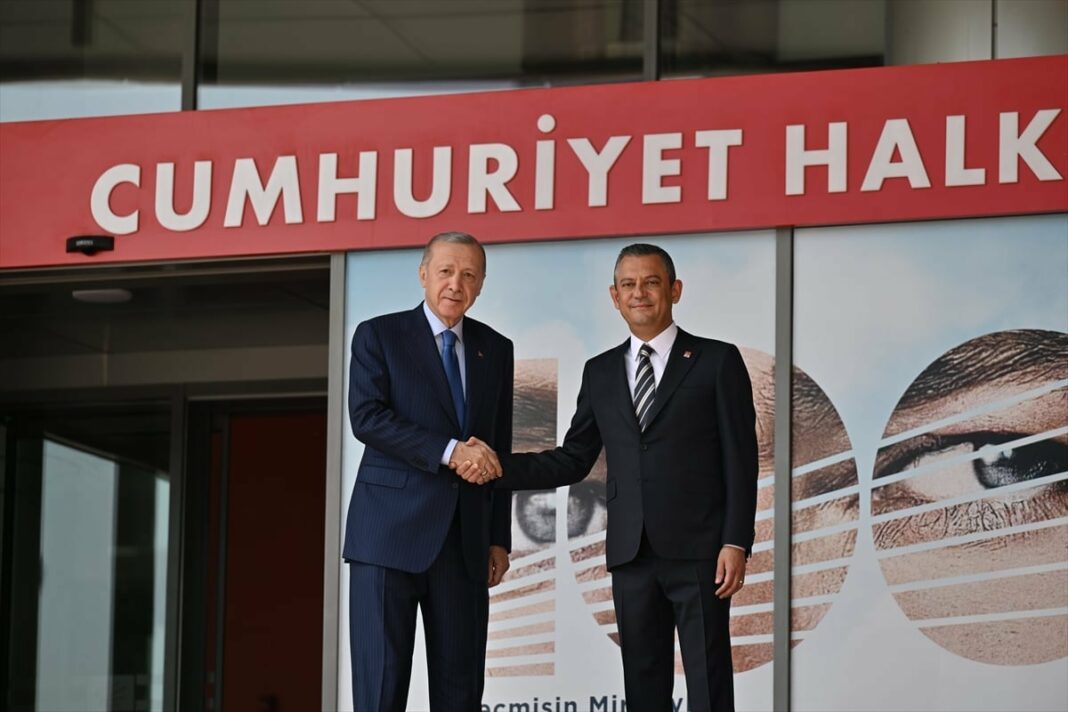More than two months after the historic defeat of President Recep Tayyip Erdoğan’s ruling Justice and Development Party (AKP) in local elections, its shockwaves might have triggered a broader realignment of alliances in Turkey’s political landscape, sparking speculation about the possible inclusion of the main opposition Republican People’s Party (CHP) in the country’s governance.
Over the past several years Turkey has been suffering from a deteriorating economy, with high inflation and unemployment as well as a poor human rights record. President Erdoğan is criticized for mishandling the economy, emptying the state’s coffers and establishing one-man rule in the country, where dissent is suppressed and opponents are jailed on politically motivated charges.
Erdoğan and his AKP managed to win last year’s parliamentary and presidential elections thanks to an alliance with the far-right Nationalist Movement Party (MHP) as well as other small nationalist and Islamist parties, as the cost of living crisis was starting to bite Turks.
However, after the elections, Erdoğan appointed former Goldman Sachs economist Mehmet Şimşek as finance minister, who started to reverse the president’s unconventional policies, which in turn started to make low income Turks bear the brunt of the consequences of the economic challenges the country faces.
This, coupled with the disillusionment of many AKP supporters as well as a leadership change in the CHP following the opposition’s joint candidate and former CHP chairman Kemal Kılıçdaroğlu’s defeat by the current chairman Özgür Özel, resulted in the CHP winning elections after after 47 years, relegating the AKP to second place for the first time in 22 years.
Erdoğan paid a visit to the headquarters of the main opposition CHP on Tuesday, marking his first visit to the party’s central office in 18 years.
The visit, part of a recent trend toward rapprochement between Turkey’s two largest parties, followed CHP leader Özel’s visit to AKP headquarters on May 2.
According to CHP sources speaking to the Turkish media, the 90-minute meeting covered a range of topics, including Turkey’s economic challenges.
As Erdoğan’s newly appointed cabinet completes its first year, economic challenges have escalated dramatically. Finance Minister Şimşek’s tenure has seen inflation soar from 38 percent to over 76 percent, the Turkish lira plummet from 20 to 33 against the US dollar, and interest rates skyrocket from 8.5 percent to 50 percent. These economic woes have left many retirees and minimum-wage earners struggling below the poverty line.
Turkey now ranks as the 117th in the rule of law index. With 356 prisoners per 100,000 people, Turkey has the highest incarceration rate in Europe. Recovery from the devastating February 2023 earthquakes, which killed more than 53,000 people. remains slow, with many areas still in ruins 16 months later.
Public discontent is palpable. Essential issues like rising costs of living and inadequate salaries dominate daily conversations, overshadowing the political theatrics.
In this context, the stability of the alliance between the ruling AKP and the MHP, the People’s Alliance, is under threat. Speculation about a collapse of the alliance has become more widespread. Recent remarks by MHP leader Devlet Bahçeli criticizing the handling of a politically charged murder case have intensified the crisis. Despite attempts to control the narrative, leaks and new revelations continue to challenge the MHP leadership as evidence points to involvement of MHP officials in the murder.
Some members of the Grey Wolves, the MHP’s paramilitary wing, were revealed to have been monitoring the family of the former leader of the group, Sinan Ateş, who was shot dead in Ankara in broad daylight in 2022. MHP executives’ fingerprints were all over the murder as the assassins were aided by MHP deputies in their escape.
MHP leader Bahçeli’s defensive statements suggest deep-seated panic within the MHP ranks. The upcoming trial on July 1, where significant evidence is expected to surface, is poised to be a critical juncture for the party.
Bahçeli yesterday remarked that his party is not opposed to the idea of a broad alliance that includes the CHP. He pointed out, however, his main concern remains the Ateş murder trial and said that his party will observe the trial on July 1.
Addressing the broader political landscape, Bahçeli noted the attempts to create “a new equation in Turkish politics” by promoting “normalization” and “easing tensions” between political parties. He welcomed constructive dialogue aimed at benefiting the country but expressed concern over what he labeled as a “smear campaign” targeting the MHP amid these discussions.
Bahçeli criticized the portrayal of the MHP as obstructive to the normalization process, highlighting the constant criticism of his party on various media platforms. He accused external and internal adversaries of trying to undermine the MHP and the People’s Alliance, claiming that the MHP’s actions are always in the best interest of Turkey and its people.
Furthermore, Bahçeli specifically addressed a certain faction within the AKP, suggesting that if their dissatisfaction with the status quo persists, an AKP-CHP alliance, supported by the broader opposition, would be preferable. Despite these remarks, Bahçeli reaffirmed the MHP’s commitment to the People’s Alliance and their support for Erdoğan, emphasizing that their dedication to the alliance remains unwavering.
CHP leader Özel has weighed in, suggesting that Bahçeli could join their “Turkey Alliance” if dissatisfied with the current alliance with the AKP.
The broader implications of Erdoğan’s party’s defeat and the ensuing political turmoil are significant. The unfolding crisis within the AKP-MHP alliance suggests a period of uncertainty and potential change in Turkish politics. Some pundits suggest Erdoğan is trying to rein in the unchecked power the MHP wields through loyalists within the judiciary, in order to be able to pick the future ruler himself without possible challengers after his death.
The outcomes of these political maneuvers will likely shape the future of governance in Turkey as Ankara navigates this turbulent period.



